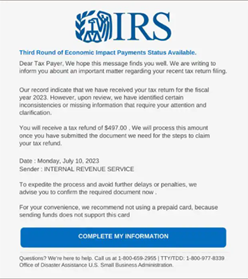Written by Chris Selvar CFP® and Dan Reece
In recent years, the rise of artificial intelligence (AI) has brought about significant advancements in various fields, including finance. However, with these advancements come new challenges, particularly in the form of AI-generated scams and fraudulent activities. As AI technology becomes more sophisticated, so do the methods used by scammers to deceive individuals and organizations. In this blog post, we will explore the rise of AI-fueled financial scams and provide practical tips on how you can protect your financial information and assets.
The Rise of AI-Generated Scams
AI-generated scams are becoming increasingly prevalent, with criminals leveraging AI to create highly convincing and sophisticated fraudulent schemes. These scams can take many forms, including deepfake videos, AI-generated voice calls, and realistic phishing emails. According to a report by Forbes, AI-enabled fraud is expected to result in $40 billion in losses by 2027 (1). The FBI has also warned that criminals are using generative AI to facilitate financial fraud on a larger scale (2).
One of the most concerning aspects of AI-generated scams is their ability to mimic legitimate communications and interactions. For example, scammers can use AI to create deepfake videos of company executives, convincing employees to transfer funds or share sensitive information. Similarly, AI-generated voice calls can impersonate trusted individuals, making it difficult for victims to detect the fraud.
Protecting Your Financial Information and Assets
Given the increasing sophistication of AI-generated scams, it is crucial to take proactive steps to protect your financial information and assets. Here are some practical tips to help you stay safe:
Stay Informed: Keep yourself updated on the latest trends and tactics used by scammers. Awareness is the first line of defense against fraud.
Verify Communications: Always verify the authenticity of any communication that requests sensitive information or financial transactions. Use known contact information to confirm the request with the purported sender.
Use Multi-Factor Authentication (MFA): Implement MFA for all your financial accounts. This adds an extra layer of security by requiring multiple forms of verification before granting access. For example, after entering your password, you might receive a code on your smartphone that you need to enter to complete the login process (3).
Monitor Your Accounts: Regularly review your financial statements and account activity for any suspicious transactions. Early detection can help prevent significant losses.
Educate Yourself and Others: Educate yourself and your family members about common scams and how to recognize them. Share this knowledge with others to help protect your community. Here are some examples of phishing emails and how to spot them (4, 5).


Invest in Security Software: Use reputable security software to protect your devices from malware and phishing attacks. Some recommended options include Bitdefender Total Security, Norton 360 Deluxe, and McAfee+ (6, 7).
Be Cautious with Personal Information: Be mindful of the information you share online, especially on social media. Scammers can use this information to craft personalized attacks. For instance, if your public Facebook profile mentions a grandson, scammers might use AI technology to call you and impersonate your grandson, claiming he is in jail and needs bail money urgently. One of our real-life clients received such a call, highlighting the importance of being cautious.

The Role of a Trusted Financial Advisor
In addition to these measures, working with a trusted financial advisor can be a crucial asset in combating AI-fueled financial scams. A financial advisor who knows you well can recognize unusual activities and help keep you accountable if they suspect you are being scammed. This trusted financial advisor can provide personalized advice and support, and can help ensure that your financial decisions are sound and that your assets are protected. As AI-driven fraud becomes more sophisticated, having a knowledgeable advisor by your side can make a significant difference in safeguarding your financial well-being.
The Bigger Picture
While AI-generated scams pose a significant threat, it is important to remember that staying vigilant and informed can go a long way in protecting your assets. By implementing the tips mentioned above and working with a trusted financial advisor, you can reduce your risk of falling victim to these sophisticated scams. As technology continues to evolve, so too must our strategies for safeguarding our financial well-being.
In conclusion, the rise of AI-fueled financial scams highlights the need for increased awareness and proactive measures. By staying informed, taking steps to protect your financial information, and partnering with a trusted financial advisor, you can help ensure that your assets remain secure in an increasingly digital world.
1: Forbes – 5 AI Scams Set To Surge In 2025
2: FBI – Criminals Use Generative Artificial Intelligence to Facilitate Financial Fraud
3: Palo Alto Networks – What are MFA Examples and Methods?
4: Norton – 10 Common Phishing Email Examples
5: HubSpot – 4 Phishing Email Examples Even I Could Fall For
6: PCMag – The Best Security Suites for 2025
7: PCMag – The Best Antivirus Software for 2025
Opinions expressed in this piece are those of the author and are not necessarily those of Raymond James. All opinions are as of this date and are subject to change without notice.

